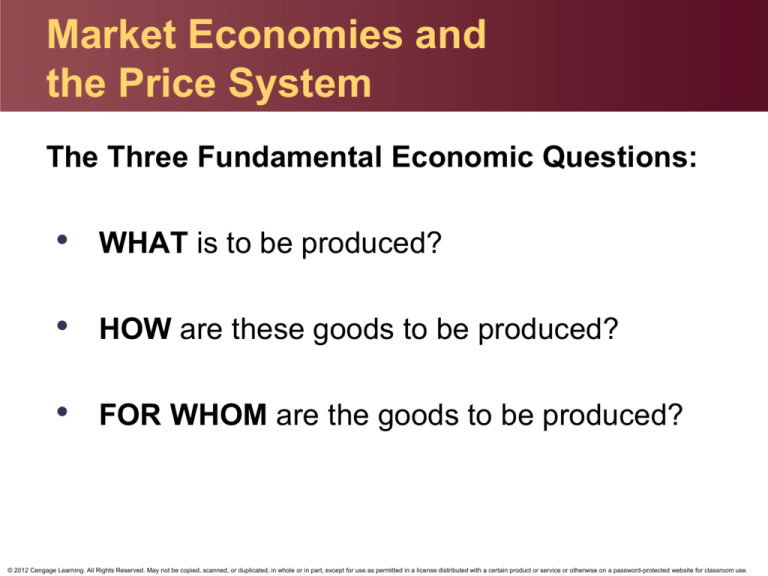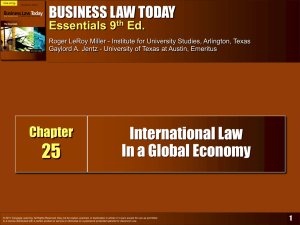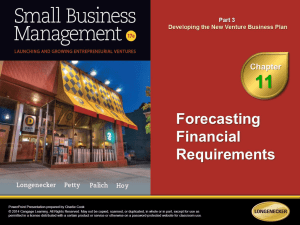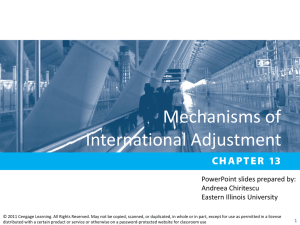
Market Economies and
the Price System
The Three Fundamental Economic Questions:
•
WHAT is to be produced?
•
HOW are these goods to be produced?
•
FOR WHOM are the goods to be produced?
© 2012 Cengage Learning. All Rights Reserved. May not be copied, scanned, or duplicated, in whole or in part, except for use as permitted in a license distributed with a certain product or service or otherwise on a password-protected website for classroom use.
Market Economies
and the Price System
• Two Alternative Approaches to Answering
the Three Fundamental Questions:
– Market Economy: an economy where most decisions
of how, what and for whom to produce are made by
individual firms, consumers and governments
interacting in markets. In this economy, production and
prices are determined in markets.
© 2012 Cengage Learning. All Rights Reserved. May not
be copied, scanned, or duplicated, in whole or in part,
except for use as permitted in a license distributed with a
certain product or service or otherwise on a passwordprotected website for classroom use.
Market Economies
and the Price System
– Command Economy: an economy where most
decisions of how, what and for whom to produce
are made by a select group of individuals and
firms that control the government. In this
economy, production and prices are determined
by the government.
© 2012 Cengage Learning. All Rights Reserved. May not
be copied, scanned, or duplicated, in whole or in part,
except for use as permitted in a license distributed with a
certain product or service or otherwise on a passwordprotected website for classroom use.
Key Elements of a Market Economy
• Freely determined price: a price that is
determined by the interaction of individuals and
firms in the market.
• Property rights: rights over the use, sale and
proceeds from a good or a resource.
• Incentives: motivate people to take action,
usually so as to increase economic efficiency.
• Freedom to Trade: allowing people to interact
freely both within and beyond national borders.
© 2012 Cengage Learning. All Rights Reserved. May not
be copied, scanned, or duplicated, in whole or in part,
except for use as permitted in a license distributed with a
certain product or service or otherwise on a passwordprotected website for classroom use.
A Role for the Government
• Market failure: any situation in which the
market does not lead to an efficient economic
outcome.
• Government failure: a situation in which the
government makes things worse than the
market, even though there may be market
failure.
© 2012 Cengage Learning. All Rights Reserved. May not
be copied, scanned, or duplicated, in whole or in part,
except for use as permitted in a license distributed with a
certain product or service or otherwise on a passwordprotected website for classroom use.
The Price System
• The Uses of the Price System in a Market
Economy
• Signals: the price of a good (profits) sends a signal
to producers to increase or decrease production.
• Incentives: higher (lower) prices of goods will
increase (decrease) the incentives for firms to
produce those goods.
• Distribution: Those who add the most value to
resources tend to earn higher incomes. Those with
higher income, buy more stuff.
© 2012 Cengage Learning. All Rights Reserved. May not
be copied, scanned, or duplicated, in whole or in part,
except for use as permitted in a license distributed with a
certain product or service or otherwise on a passwordprotected website for classroom use.
Financial Crises and Recessions
• In August 2007, the U.S. economy
experienced the beginning of a deep financial
crisis.
• The crisis was the likely cause for the recession that
started in December 2007 and ended in June 2009.
• The worst financial crisis and recession in U.S.
history occurred during the Great Depression.
• The Great Debate: Are financial crises market
failures or government failures?
© 2012 Cengage Learning. All Rights Reserved. May not
be copied, scanned, or duplicated, in whole or in part,
except for use as permitted in a license distributed with a
certain product or service or otherwise on a passwordprotected website for classroom use.
U.S. Output 1970-2011
© 2012 Cengage Learning. All Rights Reserved. May not be copied, scanned, or duplicated, in whole or in part, except for use as permitted in a license distributed with a certain product or service or otherwise on a password-protected website for classroom use.
Explaining an Economic Event
Economic Variable: any economic measure that
can vary over a range of values.
Economic Variables: Examples:
• Vehicle miles traveled per person
• Price of gasoline
Two variables are said to be correlated if they tend
to move up or down together.
© 2012 Cengage Learning. All Rights Reserved. May not be copied, scanned, or duplicated, in whole or in part, except for use as permitted in a license distributed with a certain product or service or otherwise on a password-protected website for classroom use.
Explaining an Economic Event
Positive Correlation: occurs when two variables
move in the same direction; when one goes up,
the other also goes up.
Negative Correlation: occurs when two variables
move in different directions; when one goes up,
the other goes down.
© 2012 Cengage Learning. All Rights Reserved. May not be copied, scanned, or duplicated, in whole or in part, except for use as permitted in a license distributed with a certain product or service or otherwise on a password-protected website for classroom use.
Explaining an Economic Event
Correlation versus Causation
Correlation: means that one event is usually
observed to occur along with another.
Causation: means that one event brings about
another event.
Note: Correlation does not imply causation.
© 2012 Cengage Learning. All Rights Reserved. May not be copied, scanned, or duplicated, in whole or in part, except for use as permitted in a license distributed with a certain product or service or otherwise on a password-protected website for classroom use.
Explaining an Economic Event
Controlled Experiments: empirical tests of
theories in a controlled setting in which particular
effects can be isolated.
Experimental Economics: a branch of economics
that uses laboratory experiments to analyze
economic behavior.
Observational Economics: Economists observe
economic events and try to determine the direction
and size of causal relationships without controlled
experimentation. -- (Econometrics)
© 2012 Cengage Learning. All Rights Reserved. May not be copied, scanned, or duplicated, in whole or in part, except for use as permitted in a license distributed with a certain product or service or otherwise on a password-protected website for classroom use.
Economic Models
Economic Model: an explanation of how the
economy or part of the economy works; an
abstraction or simplification of the real world.
Note: In economics, the term economic theory,
economic model, and economic law are
sometimes used interchangeably, though theory is
mostly used for general explanations while “model”
suggests a more specific explanation.
© 2012 Cengage Learning. All Rights Reserved. May not be copied, scanned, or duplicated, in whole or in part, except for use as permitted in a license distributed with a certain product or service or otherwise on a password-protected website for classroom use.
Economic Models
Microeconomics: the branch of economics that
examines individual decision-making at firms and
households and the way they interact in specific
industries and markets.
Macroeconomics: the branch of economics that
examines the workings and problems of the
economy as a whole; focuses on variables such as
GDP growth and unemployment.
© 2012 Cengage Learning. All Rights Reserved. May not be copied, scanned, or duplicated, in whole or in part, except for use as permitted in a license distributed with a certain product or service or otherwise on a password-protected website for classroom use.
Economic Models
Positively Related: a situation in which an
increase in one variable is associated with an
increase in another variable (also called directly
related).
Negatively Related: a situation in which an
increase in one variable is associated with a
decrease in another variable (also called inversely
related).
© 2012 Cengage Learning. All Rights Reserved. May not be copied, scanned, or duplicated, in whole or in part, except for use as permitted in a license distributed with a certain product or service or otherwise on a password-protected website for classroom use.
Figure 2-6
Economic Models
in Four Ways
© 2012 Cengage Learning. All Rights Reserved. May not be copied, scanned, or duplicated, in whole or in part, except for use as permitted in a license distributed with a certain product or service or otherwise on a password-protected website for classroom use.
The Ceteris Paribus Assumption
Ceteris Paribus: “all other things equal”; refers to
holding all other variables constant or keeping all
other things the same when one variable is
changed.
© 2012 Cengage Learning. All Rights Reserved. May not be copied, scanned, or duplicated, in whole or in part, except for use as permitted in a license distributed with a certain product or service or otherwise on a password-protected website for classroom use.
The Ceteris Paribus Assumption
Ceteris Paribus: “all other things equal”; refers to
holding all other variables constant or keeping all
other things the same when one variable is
changed.
© 2012 Cengage Learning. All Rights Reserved. May not be copied, scanned, or duplicated, in whole or in part, except for use as permitted in a license distributed with a certain product or service or otherwise on a password-protected website for classroom use.
Recommending Appropriate
Policies
Capitalism: an economic system in which capital
is individually owned and production and
employment decisions are decentralized.
Socialism: an economic system in which the
government owns and controls all the capital and
makes decisions about prices and quantities.
© 2012 Cengage Learning. All Rights Reserved. May not be copied, scanned, or duplicated, in whole or in part, except for use as permitted in a license distributed with a certain product or service or otherwise on a password-protected website for classroom use.
Recommending Appropriate
Policies
Mixed Economy: a market economy in which the
government plays a very large role.
Fascism: Fascism is a system in which the
government leaves nominal ownership of the
means of production in the hands of private
individuals but exercises control by regulatory
legislation and reaps most of the profit by means
of heavy taxation. In effect, fascism is simply a
more subtle form of government ownership than is
socialism.
© 2012 Cengage Learning. All Rights Reserved. May not be copied, scanned, or duplicated, in whole or in part, except for use as permitted in a license distributed with a certain product or service or otherwise on a password-protected website for classroom use.
Positive versus Normative
Economics
Positive Economics: economic analysis that
explains what happens in the economy and why,
without making recommendations about economic
policy.
Example of the scope of positive economics:
• Explaining why driving declined in 2005
© 2012 Cengage Learning. All Rights Reserved. May not be copied, scanned, or duplicated, in whole or in part, except for use as permitted in a license distributed with a certain product or service or otherwise on a password-protected website for classroom use.
Positive versus Normative
Economics
Normative Economics: economic analysis that
makes recommendations about economic policy;
aims to develop and recommend policies about
what the government should do.
Example of the scope of normative economics:
Recommending policies that will prevent driving
from rising in the future
© 2012 Cengage Learning. All Rights Reserved. May not be copied, scanned, or duplicated, in whole or in part, except for use as permitted in a license distributed with a certain product or service or otherwise on a password-protected website for classroom use.
Council of Economic Advisers
Council of Economic Advisers:
• A three-member group of economists appointed
by the president of the United States to analyze
the economy and make recommendations
about economic policy.
• Founded in 1946
• Does not represent a specific group, as the
Department of Commerce does with
businesses.
© 2012 Cengage Learning. All Rights Reserved. May not be copied, scanned, or duplicated, in whole or in part, except for use as permitted in a license distributed with a certain product or service or otherwise on a password-protected website for classroom use.
The Council of Economic Advisers
President Obama’s Council of Economic
Advisers
•
•
•
Alan Kreuger (labor), Chairman
Carl Shapiro (IO), Member ?
Katharine Abraham (macro/labor), Member
© 2012 Cengage Learning. All Rights Reserved. May not be copied, scanned, or duplicated, in whole or in part, except for use as permitted in a license distributed with a certain product or service or otherwise on a password-protected website for classroom use.








